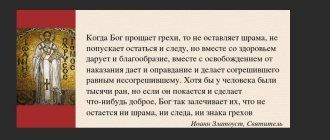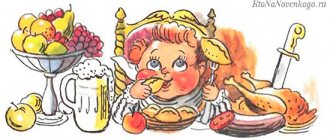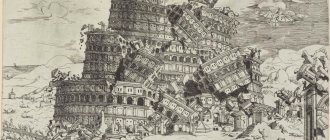Bible Questions and Answers
Published 09/12/2019
What is original sin and why do some people believe in this idea while others deny it? What does the Bible say about the idea of original sin? Why can't believers and theologians share the same position on this issue? I ask you to help me understand several issues:
How is the inheritance of the sinful nature different from the inheritance of Adam's sin? I guess these are different things. Is it true that Jesus came to completely deliver us from our sinful nature, not just from the sins we have already committed? Did Christ inherit a sinful nature? And was Job's sinful nature the cause of his sins?
Answer:
How did Adam and Eve live before the Fall?
God created man in His image and likeness, so that he would be like his Creator, consisting of three components:
- bodies,
- Souls,
- Spirit.
“Be perfect, as your Father in heaven is perfect” (Matthew 5:48) - said Christ.
The first people, Adam and Eve, lived in a wonderful Garden of Eden - Eden. Everything here was filled with joy and bliss. There was no evil, hostility, sin. Animals did not attack each other, people did not kill animals for meat and skins. They had no need for meat food (everyone ate grass and the fruits of the trees of paradise), warm clothes, and indeed any clothes at all.
Useful materials
And most importantly, God was always with them, who appeared to them in a visible way, like a kind, all-knowing, wise father. And they found the highest pleasure in conversation with Him - prayer.
Interesting fact
People were like angels, except for one very important feature: they did not have the opportunity to immediately, forever make a choice - whether to be with God or against Him. And, although they were completely free in this choice, they had yet to learn the love of God.
He could not and did not want to force people to love Himself, because real, sincere love is possible only with complete freedom, when the right to love or not to love is not limited by any prohibitions.
And then, in order to teach people this love, God gave them only one restriction of complete heavenly bliss, just one small commandment: not to eat fruits from the one and only plant in Eden, the tree of the knowledge of Good and Evil: “You must not eat from the tree of the knowledge of good and evil.” from him” (Gen. 2:17).
But at the instigation of the devil, who seduced them with his sophisticated and sweet speeches, they transgressed this easy, small commandment and committed the first sin.
ORIGINAL SIN
The problem of sin, being an integral part of the problem of soteriology, occupies a central place in the patristic heritage. At the same time, its solution, as a rule, begins with a discussion of the biblical legend about G. p. In the context of this legend, the fathers and teachers of the Church reflect on good and evil, on life and death, on the nature of man before and after the Fall, on the consequences of sin in the environment world, etc.
This problem attracted the attention of the first apologists of the Church. Yes, martyr. Justin the Philosopher, contrary to the Hellenistic ideas about the immortality of the soul that were widespread in his time, argued that the soul “if it lives, it lives not because it is life, but because it participates in life” (Iust. Martyr. Dial. 6). As a Christian, he confessed God as the only source of life, in whose communion only all things can live. The soul is no exception in this regard; in itself it is not the source of life, because man possesses it as a gift received from God at his creation. Mch. Justin said almost nothing about the fate of the soul that has lost unity with God. He only asserted that such a soul dies. The dead soul, which nevertheless continues to exist, is not the object of his observation.
At St. Theophilus of Antioch has a twofold understanding of the sin of the first people. Following a widespread exegetical tradition, he argued that this sin was manifested in Adam and Eve's disobedience to God. At the same time, he said that the ancestors ate the forbidden fruit, being not ready for such food. “By age,” he noted, “Adam was still a baby, which is why he could not properly accept knowledge” (Theoph. Antioch. Ad Autol. II 25). Similar to ap. Paul, who distinguished between “solid food” and “milk of the mouth” (Heb. 5.12; cf. 1 Peter 2.2), St. Theophilus classified the “food of knowledge,” the fruits of which were on the corresponding tree, as “solid” food. Just as “a baby immediately after birth,” wrote the Antiochian saint, “cannot eat bread and therefore feeds on milk,” so the first man, just created by God, could not eat the fruits of the tree of knowledge (Theoph. Antioch. Ad Autol. II 25) . According to St. Theophilus, as in the ap. Paul, who warned that knowledge can not only enrich, but also “puff up” (1 Cor 8.1), knowledge is “beautiful” only for “who uses it well” (Theoph. Antioch. Ad Autol. II 25).
The untimely consumption of the “food of knowledge” led the first man to sin, for which God, “as if condemning him into exile, expelled him from paradise.” However, this is the expulsion of St. Theophilus did not perceive this as an ordinary punishment. He saw in it a cleansing effect, thanks to which a person will eventually be “returned to paradise” (Ibidem).
Consequences of G. p. in the surrounding world St. Theophilus of Antioch looked at the example of wild animals. “The animals (θηρία), he wrote, got their name because they went wild (θηρεύεσθαι), and not because they were supposedly initially evil and poisonous, for nothing evil was originally created by God, but everything was beautiful” ( Ibid. II 17). They were “spoiled” by sin, which violated the rules and norms not only of human existence, but also of natural existence. In the world around us, St. noted. Theophilus, what is happening in the house is that the owner begins to behave unworthily - this also negatively affects the behavior of the domestic worker.
The original explanation of G. p. was given by schmch. Irenaeus of Lyon. Drawing a parallel between the Virgin Mary and rights. Joseph the Betrothed, on the one hand, and Eve and Adam, on the other, he noted that both couples were initially brought together by virginity. The first people “were naked in paradise and were not ashamed,” he quoted the biblical text and continued: “because, having been created shortly before, they had no idea about the birth of children” (Iren. Adv. haer. III 22. 4) . However, Eve disobeyed God and “became the cause of death both for herself and for the entire human race.” Sschmch. Irenaeus did not directly say how this disobedience was manifested. However, 2 notes that he made in this regard allow us to come to the conclusion that, in his opinion, the forefathers entered into marriage prematurely, as expressed by G. p. He wrote: “Adam and Eve had to... first mature , and then multiply,” and also, contrasting the Mother of God to Eve, noted that the Virgin Mary, unlike Eve, observed virginity and “through obedience became the cause of the salvation of both Herself and the entire human race” (Ibidem).
Describing the consequences of G. p., sschmch. Irenaeus did not evaluate them unequivocally negatively, since, according to him, through them a person acquires a “double understanding” of good and evil. “By the generosity of God,” he wrote, “man came to know both the good of obedience and the evil of disobedience, so that the eye of the mind, knowing both from experience, wisely chose the best... But how could he understand good without knowing what is opposite to it? » This thought is overwhelming. Irenaeus states more decisively: “Whoever avoids the knowledge of both (i.e., good and evil - M.I.) and double understanding, imperceptibly kills the person in himself” (Ibid. IV 39. 1), since the latter becomes a bearer of the image and likeness of God only when he “receives the knowledge of good and evil” (Ibid. IV 38.4).
However, a person acquires such “double understanding” at too high a price - through disobedience to God, manifested in the sin of the first people. And yet, according to schmch. Irenaeus, although disobedience is evil and must be rejected “through repentance as something bitter,” a person who has committed a sin “comprehends with his mind what is the opposite of good and sweet, so that he never again tries to taste disobedience to God” (Ibid. IV 39 . 1). Position sschmch. Irenaeus can be interpreted to mean that the manifestation of sin serves the purpose of human improvement, since it contributes to the recognition of good and evil. However, such an idea that understanding comes only after committing a sin does not correspond to Christ. view of the process of cognition. Sin only darkens a person’s consciousness and reason and therefore is not the appropriate path to distinguishing between good and evil.
Some have Christians. authors (see: Men A., Archpriest. The Origins of Religion. Brussels, 1970. P. 215) the introduction to evil is recognized as a special way of knowledge. However, Christ. the ascetic does not know the statement “evil cannot be known without being involved in it” (Ibid.). On the contrary, she offers Christ. the ascetic has a comprehensively developed methodology for confronting evil and fighting it, seeing in it the guarantee of spiritual insight and sobriety, so necessary for a person in his knowledge of what is good and what is evil. The correctness of this technique is confirmed not only among countless numbers of righteous people who struggled with sin, but also among an even larger number of sinners who had enormous practical experience of sin, which, however, did not help them in the fight against evil, but only worsened their spiritual condition. If such sinners returned to God, then, as a rule, with the help of the same righteous people, who learned to fight sin not through communion with it, but through opposition to evil.
Clement of Alexandria, using the allegorical method, offered a free interpretation of Gen. 2. 8-9. In his opinion, Moses called the tree of life “divine understanding” (τὴν φρόνησιν θείαν), and paradise - the world created by God (Clem. Alex. Strom. V 11.72). Clement also has a discussion about the consequences of G. p., which is polemical in nature. Clement argues with those who placed the blame for the first sin not only on Adam and Eve, but also on their descendants. “Let them tell us where (they met. - M.I.) a child who, immediately after birth, would already be able to sin? And how, having done nothing, can it be subject to Adam’s curse?” - he asks a rhetorical question and proceeds to explain Psalm 50. 7: “... I was conceived in iniquity, and in sin my mother gave birth to me.” Here Clement of Alexandria again resorts to the allegorical method of interpretation and points out that the prophet. By mother David means Eve. She truly was “the mother of the living,” for “she became the mother of all living” (Gen. 3:20). As for the prophet himself. David, then, although he was conceived in sin, he was not a sinner at the moment of birth (Clem. Alex. Strom. III 16. 5-7).
Expulsion from paradise. Gallery painting c. Resurrection of Christ in Rostov. 2nd half XVII century Expulsion from paradise. Gallery painting c. Resurrection of Christ in Rostov. 2nd half XVII century
St. Athanasius I the Great argued that the nature of the first people before they committed sin was perishable, meaning not real perishability, which appeared along with the appearance of sin, but potential perishability, indicating that human nature in itself was not incorruptible , nor immortal. Potential corruption could have remained unrealized at all if the human race had not been struck first by G. p., and then by subsequent sins. To preserve conditional incorruptibility and immortality, the first people needed not only not to sin, but also to use the grace-filled Divine help, which would strengthen and lead their nature to perfection (Athanas. Alex. De incarn. Verbi. 5).
His thoughts about G. p. St. Basil the Great prefaced with a question about the origin and nature of evil. It goes without saying, he noted, that evil never comes from a good God. However, if something good is damaged, it can give rise to evil. Initially, this happened in the angelic world, where the first angel in dignity and honor rejected the grace-filled connection with God and became the founder of evil. “Why is the devil angry?” - asked St. Vasily answered: “According to his own will.” For the same reason, evil arose in man, although he was tempted by the devil. Regarding the nature of evil, the Cappadocian saint expressed a tradition. for patristic thought: evil as an essence does not exist, because God did not create evil. More precisely, it “exists... not in its being” and appears from “damage to the soul.” Such a strange phenomenon of St. Vasily explained with a simple example. A person with good eyesight has no room for blindness. The latter appears only when vision is lost. The cause of blindness was eye disease; the cause of evil was illness of the soul (Basil. Magn. Hom. 9).
St. Vasily enters into polemics with those “who reproach the Creator” for creating man capable of committing sin. He refuted the opinions of his opponents by comparing God with a master, whose servants are subordinate to him. The owner can exercise coercion and force the servants to do this or that work. However, he would like them to do this willingly and voluntarily. “In the same way, God... is pleased... not what (is performed - M.I.) under compulsion, but what is done out of virtue. Virtue comes from will, and not from need, but will... depends on us.” Those who reproach the Creator do not realize that a being incapable of sinning, which they would prefer to a human being, is a “dumb being,” that is, an animal that does not have freedom of moral choice. However, it is free will that makes a person human, although it is associated with the risk of his spiritual fall (Ibidem).
Speaking about nakedness, the edges were revealed to the first people as a result of the Fall and forced them to sew clothes, St. Basil the Great noted that the ancestors would have needed “robes” in any case. However, if they had remained obedient and faithful to God, this garment would have been completely different. It would “shine ... from the grace of God and shine” like “an angel’s vestment”, surpassing the radiance of the stars and the beauty of flowers (Ibidem).
St. Vasily did not perceive death only as a consequence of G. p. It also has a positive meaning for him, an example taken from everyday life again helps him determine this. Comparing fallen human nature with a broken clay vessel (cf.: “vessel of flesh” - Great Canon of St. Andrew of Crete, canto 4), he pointed out that the vessel must be “consigned to fire,” with the help of which only its restoration is possible. For the same purpose, the “wise Provider” puts to death the vessel of human flesh (Ibidem).
Commenting on the words of the prophet. Ezekiel “the soul that sins, it shall die” (Ezekiel 18:20), St. Gregory of Nyssa notes that the death of the soul occurs because “sin is alienation from God—the true and only Life.” This is exactly what happened when the “primeval one” showed disobedience: “on the same day the death sentence was pronounced over him.” And, although the death of the body came later (“many hundreds of years after disobedience”), “God did not lie when he said: “In the day that you eat of it, you will die” (Gen. 2.17)” (Greg. Nyss Contr. Eun. II 13).
Reflecting on the fall of the first people, St. Cyril of Alexandria posed the following question: if “such a great misfortune” awaited a person in paradise, then wouldn’t it be better for him not to be born at all, that is, in the words of the saint, “not to have existence”? At the same time, St. Cyril referred to the words of Jesus Christ: “... it would have been better for that man not to have been born” (Mark 14:21). However, answering this question, the Alexandrian saint found compelling arguments in favor of the appearance of man on earth. Firstly, existence as a gift of life is always better than non-existence; secondly, God gives man not simple existence, but well-being (the first people “received existence, and, moreover, for good”); thirdly, a great and glorious future awaits created man: he must become a partaker of the goodness of the Creator. On the path to this glory, sin is a significant obstacle, but the All-Wise Creator found a very suitable cure for it: the corruption of the human body and its subsequent death. “The death of the flesh was invented with benefit,” wrote St. Cyril, “not leading (a person. - M.I.) to complete destruction, but rather preserving [him] for a while for renewal, like a kind of broken vessel” (Cyr. Alex. Glaph. in Pent. I 3-4).
According to the blessed Augustine, the plan for the construction of the City of God took into account the fall of the first people. Therefore, G. p. could not “force God to change His definitions.” Although in St. In Scripture you can find the following passages: “... the Lord repented that he had created man...” (Genesis 6.6); “I regret that I made Saul king ...” (1 Samuel 15. 11), however, they “say ... what man hoped for or what followed from the order of natural causes,” and not that “the Almighty knew in advance that He would do this” (Aug. De civ. Dei. XIV 11. 1).
The shame of the forefathers caused by the nakedness of their body, blzh. Augustine explains as follows. Nakedness itself could not cause a feeling of shame in Adam and Eve, since before the Fall they were also naked, but were not ashamed of it (cf. Gen. 2.25). This feeling arose for other reasons. With the advent of sin, the hierarchy of human nature was disrupted, as a result of which “the soul lost its former obedience from the body.” Having left the Lord “of its own free will,” the soul no longer had the willpower to keep the “lower servant” in its submission, that is, the body, the members of which “felt a new movement” that caused shame, that is, they became lustful. At the same time, blzh. Augustine referred to the words of St. Paul (Gal. 5. 17): “...the flesh desires what is contrary to the spirit, and the spirit what is contrary to the flesh: they oppose each other...” (Aug. De civ. Dei. XIII 12).
Blzh. Augustine saw 4 types of death that appeared as a result of the sin of the first people: the death of the soul that broke the connection with the source of life; the death of the body, abandoned by the soul and buried in the grave; “death in its entirety, when the soul is punished by losing both God and body”; “second” death, “when the soul, abandoned by God, suffers eternal punishment along with the body” (Ibid. XIII 13). Information about the “second” death of the blessed one. Augustine undoubtedly drew from the book. Revelation (2.11; 20.14; 21.8).
The Bishop of Hippo not only offered his explanation of the fall of the first people, which, as he noted, was expressed in the disobedience of Adam and Eve, but also considered other ways of understanding this tragedy. If the 1st, which boils down to “that the first people secretly consummated their marriage and had copulation before the Creator united them,” he rejected, then regarding the 2nd, according to which Adam and Eve “too early succumbed to the desire to know good and evil and prematurely wanted to receive what had been delayed for them until a more favorable time,” he did not make a decisive judgment. For the darling Augustine, such a version could only take place if “we wanted to understand the tree of the knowledge of good and evil not in its own meaning, as a real tree with real fruits, but allegorically” (Aug. De Gen. XI 41, 56).
With the special power of rhetorical talent, Blessed. Augustine depicted the state of human nature, stricken by sin. Why, he wondered, “do we remember with difficulty, but forget without difficulty, acquire knowledge with difficulty, but remain ignorant without difficulty, be active with difficulty, but lazy without difficulty? Isn’t it clear from here what... vicious nature is prone to, (oppressed - M.I.) as if by its own weight” (Aug. De civ. Dei. XXII 22. 2).
The spiritual savagery of the first man led, noted St. Simeon the New Theologian, and to the savagery of the animal world, for whom Adam became a “criminal.” The animals “didn’t want to obey the criminal anymore.” They “began to despise him” and were even “ready to attack him” (Sym. N. Theol. Eth. 1. 2).
Vice: what is it from the point of view of Orthodoxy
What is meant in Orthodoxy by the concept of “Sin”? This is a thought, desire, or action (in some cases, inaction) that conflicts with God’s commandments, moral laws, and religious norms.
According to St. John of Damascus, “Sin is a voluntary deviation from that which is in accordance with nature into that which is unnatural (against nature).”
It is interesting to note that this word comes from the Greek “miss”, “shot wide of the target”. Thus, the sinner misses the purpose of human existence, falls short of his destiny to conform to the image and likeness of God.
Sin, settling in the human soul, gives rise to illusions in it:
- Freedom,
- Knowledge,
- Pleasure.
By flouting generally accepted rules, the sinner imagines himself free from restrictions (religious, social, family rules), but he falls into a much greater, slavish dependence on his sinful lusts and actions. Hiding behind the acquisition of new knowledge, the sinner simply justifies his true goals: to develop pride, to satisfy lust, to gain new pleasures.
He cannot understand that satisfaction from sin each time gives rise to new, even greater lusts, which again require new pleasures. This is akin to the desire of a drug addict who increases the dose each time to achieve new pleasures.
The Creation of Adam and Eve, the Fall, Expulsion from Paradise. Middle composition of the northern altar door of the Annunciation Cathedral in Solvychegodsk.
And until there is complete awareness of one’s sin, repentance for it, an all-consuming desire to cleanse oneself, to reconcile with the Divine will, there will be no return to God.
And then action is necessary: the sinner must resolutely give up sinful habits: the fornicator must lead a chaste life, the drunkard must give up wine, the glutton must eat in moderation, the lover of anger must acquire humility, and so on.
The sacrament of church repentance, communion of the Holy Mysteries of Christ, and churching are necessary. Only along such a narrow, thorny path can one find the path to God again.
Dejection what is it?
Laziness or despondency (idleness, inaction).
These are also sins that are considered mortal.
When a person is not busy with anything, his “biocomputer” (brain) naturally stops working. Life energy decreases (as unnecessary and unclaimed). A person feels his vital energy less and less. It cannot be spent either on knowing oneself as a spiritual being, or on understanding what one can do and what one should not do. Man is gradually turning into an unreasonable creature. Laziness and despondency are, in fact, a decrease in one’s vital energy, and in fact, a slow death. It is no coincidence that these sins relate to mortals.
—————–
All human sins come from one another. Here is an excerpt from the oldest Holy Scripture:
BHAGAVAD - GITA: Chapter 3 “KARMA YOGA”; Text 36-40
First appears - lust . Then, as a consequence, there is greed for the accumulation of material resources in order to best be able to satisfy - lust.
Then - envy of those who achieve more than you in their lust. If a person achieves status in society and has great opportunities to satisfy his lust, vanity . Anger takes possession of a person if he fails to achieve the object of his desire. Next - despondency , laziness and apathy.
And all these sinful actions and ways of thinking, as well as violation of the commandments: do not judge, do not lie, do not covet someone else’s, do not steal, do not kill, and others, have one common property: a decrease in vital (mental) energy.
What happens to the soul (consciousness) of a person who commits certain sinful acts is described in detail in the article on the site - “WHAT HELL AND HEAVEN LOOK LIKE IN REALITY -
How did the first people sin?
The sin of the first people in Paradise led to a distortion of man's relationship with God. Adam and Eve, seduced and succumbing to temptation, began to perceive the forbidden fruit (not necessarily an apple) only as a “thing for themselves”, and not an object of God’s commandment. That is, Eve, succumbing to the devil’s temptation, began to see in the forbidden fruits not what they really are, but what she herself desired:
- It is good for food, has a wonderful taste, since it is prohibited! This is the lust of the flesh;
- How beautiful he is, pleasing to the eye. This is the lust of sight, the desire for pleasure;
- Giving new knowledge, the same as that of God (according to her understanding). This is the pride of life.
It must be well understood that Adam and Eve did not sin in Eden in a carnal way. God Himself commanded them to be fruitful and multiply, and in no way hindered physical intimacy. The essence of original sin was that they violated the commandment, the agreement with the Creator, in their proud desire to become equal to God.
This is precisely the thought that the enemy instilled in Eve: you will be like gods, you will know everything yourself! Thus, the greatest sin of pride, which had previously seduced Dennitsa to rebellion against God, turning him into Satan, a hater of all people, was transferred to the Ancestors and accepted by them.
Consequences
This sin is revealed as original because it became the root of all other sins. Without it, neither adultery, nor theft, nor murder, nor other violations of the commandments would have appeared.
It became the basis and cause of damage to the entire nature of man, his soul and body. And all the seed of Adam, his descendants and the foremother Eve carry within them the sprouts of original sin: bad will, weakness under the influence of demons, readiness to carry out their unclean instructions.
The only one of all who escaped the manifestation of original sin in himself was the God-man Jesus Christ, Who was conceived by the Holy Spirit, combined in Himself two principles, Divine and human, and therefore did not carry within Himself the seed of this sin.
The Catholic Church claims that the Virgin Mary did not inherit this damage to nature, like the Infant God, and was thereby freed from original sin. This is the so-called Dogma of the Immaculate Conception of the Virgin Mary, according to which the Mother of God does not carry it within Her, despite the fact that she was conceived by Her parents naturally.
The Fall of the First People in Paradise
This dogma was proclaimed in 1854, and states that this non-involvement was granted to Her from birth, on account of the future merits of Christ the Redeemer. While in Orthodoxy we deeply reverence Her personal sinlessness, at the same time accepting the understanding that She is not deprived of the action of original sin.
Thus, all people, all descendants of the Ancestors, conceived in the usual way, without the participation of Divine powers, bear the mark of original sin, and must make considerable efforts to resist hostile spirits that in every possible way attract to evil, prompting the sinful nature to commit direct sinful action.
Did original sin have power over Christ?
According to the teaching of the Orthodox Church, expressed by the IV Ecumenical Council, our Lord Jesus Christ is “perfect in humanity... like us in everything, except sin” (Acts of the Ecumenical Councils. Vol. 3, p. 48). The Lord Jesus Christ accepted human nature and “blameless passions,” that is, natural infirmities. At the same time, His humanity was not involved in any sin; sinful disorder and inclination to sin were alien to Him. The New Testament repeatedly emphasizes the complete non-involvement of the incarnate Son of God with any sin. The Holy Apostle Paul teaches that “God sent His Son in the likeness of sinful flesh” (Rom. 8:3), and “He made him who knew no sin to be sin for us” (2 Cor. 5:21). Jesus Christ “has been tempted in all respects as we are, yet without sin” (Heb. 4:15), “holy, free from evil, blameless, separated from sinners” (Heb. 7:26), He “offered Himself blameless to God by the Holy Spirit” ( Heb.9:14). The Holy Apostle John the Theologian says about the Savior that “there is no sin in Him” (1 John 3:5).
And Christ did not have original sin from the very moment of his incarnation. The Savior, being omnipotent and all-perfect, voluntarily, for the sake of saving people, accepted in the incarnation such consequences of ancestral sin as corruption (blameless passions: fatigue, hunger, the need for sleep) and mortality. After the Resurrection, Christ became incorruptible and immortal (according to human nature).
Heredity
First of all, it manifested itself in the fact that Adam and Eve, created by God in His image and likeness, not previously distorted by original sin, after the Fall began to pass on this damage to their descendants. Adam gave birth to them no longer in God’s image and likeness, but in his own, distorted by the Fall.
And all of humanity was born affected by this disease, no matter how sinless they were in themselves! You can often hear from people of little faith: “Adam sinned: what do I have to do with it?” It was said by the righteous Job: “Who will be clean from filth? No one else, even if he lived only one day on earth” (Job 14:4-5). That is, even a baby who has just been born and has not had time to sin in any way already bears the mark of original sin!
Therefore, the Orthodox Church considers it advisable to baptize newly born babies, without waiting for them to reach the age of reason, as some adherents of heretical teachings do. The heredity of original sin is a given that cannot be avoided, but can be corrected by accepting Holy Baptism and becoming a church member.
Heavenly pleasure on Earth: what is it and is it possible?
More likely no than yes. And there is an explanation for this. For people, pleasure and happiness are forms of entertainment. We try to avoid suffering and get a tidbit of happiness. There is imaginary pleasure, followed by sinfulness and disintegration of the soul. This includes:
- Consumption of alcohol, drugs.
- Smoking.
- Gluttony.
- Sexual contacts, etc.
All this brings joy, only for a short period of time , because behind it lies lust and passion. They cloud the mind, so people often cannot get out of this vicious sinful circle on their own. They get used to this imaginary happiness, but over time it disappears. Happiness can be achieved by an Orthodox person who, when he sees such things, tries to avoid them. He will prefer to spend time with his family, helping his loved ones and those in need of help. Such things charge the soul with good energy for a long time.
If the Ancestors had not sinned?
God created man in His image and likeness, and, therefore, gave them free will. Initially, people were created not as puppets, whose behavior and reactions are completely controlled by their creator, but as beings who choose without coercion, feel freely, and show their love according to their own understanding.
It didn’t cost Almighty God anything to destroy the devil’s machinations, to appear at the right moment, to warn Adam and Eve, and even simply to forbid them to eat the forbidden fruit. Then there would have been no Fall, people would have continued to live in Paradise, remaining just as sinless and pure, in unity with God, their Creator and father.
Would that be good? No, it's not good! A person deprived of choice becomes a slave. If God, by His will, had stopped the temptation of the Ancestors, they would have lost their choice, and they would have had no love for the Creator, and no obedience for the sake of this love, but only a mechanical prohibition, the inability to sin due to external circumstances.
After all, He gave the simple commandment specifically for love, free will, when you don’t want to break it or sin, so as not to upset the One who gave it. After all, it would be much easier to hide the Tree of Knowledge in some inaccessible corner, preventing the opportunity to pick the forbidden fruit.
But even if this is done, wouldn’t the enemy of the human race come up with other temptations in which to sin? And the Creator would have to watch his children all the time, constantly forbidding them to do anything? What kind of love is this...
For the same reason, God did not “mechanically” return people to their original state, as if destroying their sin, giving them the opportunity to “start from scratch.” A person should not have sinned of his own free will, and not out of fear of punishment, or out of inability to commit a sin.
How to return God's grace?
Photo: Stihi.ru
The Savior gave the human race a chance to return God’s Grace, who set an example of spiritual struggle against sin, heroism and self-sacrifice. He opened up the opportunity for people to fill their souls again with the Holy Spirit, to resurrect them to a blessed life. This opportunity requires a feat, thanks to which God inhabits a person and returns his Grace to him.
This feat - prayerful, merciful, love for one's neighbor, repentance - is within the power of every person. You just need to decide on it, seeing the main goal in front of you - the eternal blissful life of your immortal soul.
( 5 ratings, average: 5.00 out of 5)











